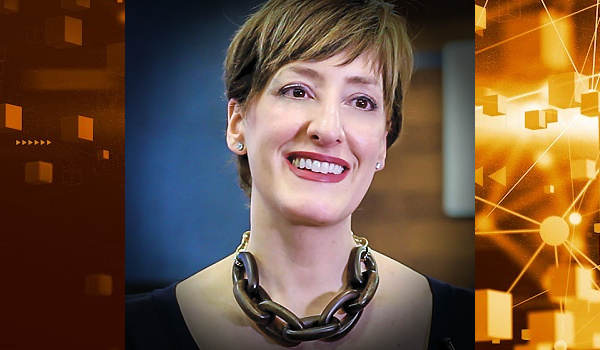DeFi industry luminary Caitlin Long discusses the power of blockchain with Digital Wealth News, along with her personal connection to Wyoming and her quest to help bring an honest and accurate ledger to the banking and financial industries.
Custodia Bank founder Caitlin Long has become such a household name in blockchain circles that most of her press can dispense with the introduction.
Not only has she been an outspoken advocate for the technology and its applications in the financial services industry, she has also spearheaded many of the efforts that led to Wyoming becoming one of the most progressive states in creating policy to foster the development of blockchain and cryptocurrency businesses.
Now she’s helping provide guidance for the University of Wyoming Blockchain Education Initiative, a 12-course blockchain education curriculum being developed for high school juniors & seniors as well as community college students.
“I grew up in Wyoming, so that’s the connection,” she said. “Even when I was in New York, went off to the big city, and was there on Wall Street for 22 years, I always kept one foot back home. [Staying connected to home has always been important to me.]”
Working in New York, Long identified a lot of problems with traditional financial services technology—what she describes as a “really complex Rube Goldberg machine.” When she started on Wall Street, it took five days to settle a stock transaction.
That was in 1994. Nearly thirty years later, it still takes two days, said Long, yet information can move at the speed of light.
The problem is rampant throughout finance—a corporate client took six days to move their own money from a manufacturing facility in Thailand to their home office in Silicon Valley, said Long.
“What you quickly realize is that money and ownership records are just ledgers,” she said. “And what you really want is an honest and accurate ledger, I don’t think anyone can deny that. What we have, however, because of history, is what technologists would call tech debt, except I would call it operational debt.”
Over time, layers of intermediaries have been built into the financial system, said Long, often times on purpose because transactions could be batched and settled net at each layer of intermediary “so you wouldn’t have to solve or settle every single transaction, you could just settle the net of all the transactions between two parties, and then, at each layer, you settled the net of those so that at the top of the pyramid, at the Federal Reserve every night, they’re only settling with a couple hundred banks as opposed to settling with 350 million Americans.”
The same thing happens with securities, where the Depository Trust Company sits at top of a pyramid of transactions, said Long. When someone trades within a brokerage account, the broker takes the net of their purchases and sales, and then settles them against other brokers in one big transaction. In the past, the system increased the efficiency of work because millions of transactions could be settled as batches.
“Now, we don’t need any of that and we’re stuck with it, and there are there are a lot of incumbents who make a lot of money from the existing system and are fighting like crazy to stop those of us who are trying to bring efficiencies and fairness and honesty and accuracy to the ledger systems,” said Long.
But what about new technologies that seem to allow instant peer-to-peer transactions, like Zelle and CashApp and PayPal, some of which appear to move seamlessly over international borders? They’re all still running on the same antiquated infrastructure behind the scenes, said Long.
“Maybe what’s happening on the front end is that it appears that it is going immediately, but it’s a Ferrari front end with a horse and buggy back end,” she said. “So what’s happening is that somebody’s taking counterparty credit exposure for the unsettled transaction between the time of transacting and the time of settlement. For international payments, they go through something called Swift, which is the way that international banks work with each other. The average foreign exchange transaction gets processed six times. Why? Because there are typically six intermediaries that are involved in average foreign exchange transactions – two banks and a central bank in one country, and then the central bank and two banks in the other country.”
These intermediaries don’t reconcile simultaneously, said Long, they must go in sequence, and reconciliation of ledger systems often happens only once each day. But technology like blockchains, which create shared ledgers that update simultaneously for all users, settlement and reconciliation can happen at the speed of light.
But it still doesn’t, said Long. Even Bitcoin is designed to be slower than technology could permit: A Bitcoin block is appended every 10 minutes, on average.
“It turns out that, as we’ve learned in the stock market, sometimes slowing things down and not having settlement happen at the speed of light is valuable,” said Long. “There’s a big brouhaha in in the stock market over payment for order flow. Brokers jump ahead of the orders being sent by their customers and clip a small percentage of every stock trade. That turns out to be enormous profits for brokers that do this. There’s a lot of controversy around this very issue. There should be… Because there is a lot of unfairness in my humble opinion.”
The problem is that these slower systems result in bizarre and sometimes expensive errors, said Long.
Take the Dole Food case. In 2017, Dole was acquired and a lawsuit was filed, said Long, where shareholders argued that they were owed extra cash as part of the transaction. To distribute the extra cash, the court in Delaware said every shareholder needed to come forward with brokerage statements to determine who was owed the extra cash..
“Well, it turns out that shareholders submitted valid brokerage statements that, when added up, showed a count of Dole Food shares equal to 1/3 more shares than there were actual Dole Food shares outstanding,” said Long. “That meant 1/3 of the people who bought Dole Food shares got fake shares, and that fake supply caused the price of the real shares to decline so that the legitimate shareholders of Dole Food had their pockets picked in a way so subtle it was impossible to detect at the time. Okay, how did the ledger systems of Wall Street get so out of whack with reality? I know exactly how. Some of it was nefarious, but actually the vast majority of it was not — it was simply that the ledger systems are never in sync with each other. To account for this, Wall Street builds in fault tolerance to recognize the reality that its systems don’t update in real-time. So basically, it’s precisely because these ledger systems are not in sync with each other at all times that you can end up with this craziness.”
In another example, a 2016 speech by a Delaware chancery court judge claimed that corporate proxy voting is so muddled with error that in proxy contests where the vote comes to within 10 percentage points, the true winner cannot be determined.
And that’s how corporate governance is conducted in 2023 in the United States.
“The power of Bitcoin specifically and blockchain technology more broadly is that we get to an honest accounting system, we get to an honest ledger,” said Long. “Everyone knows exactly who owns what, at any moment in time. And it’s just transparent and out there for anyone to check from, literally with almost no cost.”
INTERVIEWEE BIO: Caitlin Long is Founder & CEO of Custodia Bank, and a 22-year Wall Street veteran who has been active in bitcoin and blockchain since 2012. In 2018-20 she led the charge to make her native state of Wyoming an oasis for blockchain companies in the US, where she helped Wyoming enact 20 blockchain-enabling laws. From 2016-18 she jointly spearheaded a blockchain project for delivering market index data to Vanguard as chairman and president of Symbiont, an enterprise blockchain start-up. Caitlin ran Morgan Stanley’s pension solutions business (2007-2016), held senior roles at Credit Suisse (1997-2007) and began her career at Salomon Brothers (1994-1997). She is a graduate of Harvard Law School (JD, 1994), the Kennedy School of Government (MPP, 1994) and the University of Wyoming (BA, 1990).

We are proud to announce that Digital Wealth News, in conjunction with the American Crypto Academy, has partnered with the University of Wyoming Center for Blockchain & Digital Innovation to offer a 12-module course on blockchain for Wyoming’s high school juniors, seniors & community college studentes beginning with the Fall 2023 school year. The modules will also be available for a nominal licensing fee to other schools throughout the US.
Contact DWN’s publisher Cindy Taylor at cindy (at) dwealth (dot) news if you would like details on sponsoring this initiative or how you can help bring these modules to students in your community.
CLICK HERE FOR MORE INFO ON THIS DIRECTIVE







